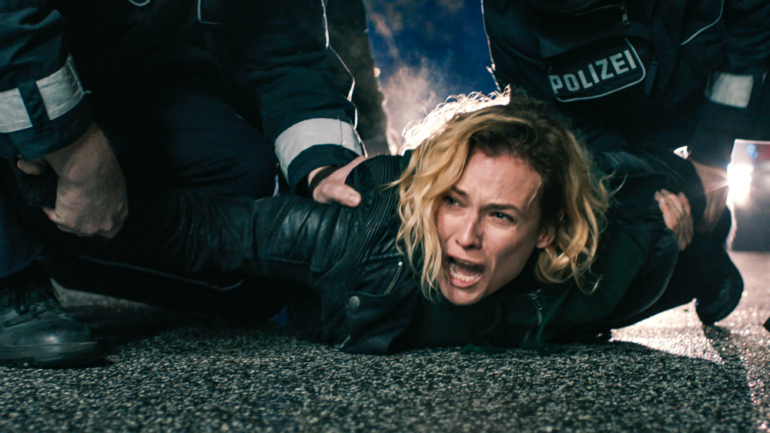In the Fade opens with the promise of something good coming out of something bad. But despite the fact that director Fatih Akin’s gripping tale of justice and revenge repeatedly dangles that hope and promise in front of its audience, and allows us to believe that justice may prevail, in the end the film makes us doubt our belief, in fate, faith, and in the power of good over evil. Yet, for all its faults, it’s a powerful ending to a film that poses tough questions.
Akin, born in Hamburg to Turkish patents, whose 2007 film ‘The Edge of Heaven’ similarly explored identity issues, and cross cultural politics in the German Turkish community, uses In the Fade to explore one woman’s struggle in a way that makes a statement about the changing dynamics of global society. And it does so mostly without preaching.
In the Fade begins with a prison wedding between Nuri (Numan Acar), a convicted Kurdish drug dealer, and Katja (Diane Kruger), his glowing German bride. Flash forward a few years to Katja blissfully walking the streets of Hamburg with Rocco, the couple’s young son. They’re on the way to Nuri’s office. Now running his own business advising members of Hamburg’s Turkish community on tax and legal matters, it seems clear that Nuri has gone straight, and the happy couple has indeed made something good from Nuri’s dark past. Leaving Rocco with Nuri, Katja heads off for a day of “girl time” with her sister Birgit.
Returning later that night to pick up the boys, Katja discovers that Nuri’s office has been bombed, and soon learns that both he and Rocco have been killed. What follows is a nightmare of police intrusion into her mourning, and into Nuri’s drug dealing past and connections to the Turkish community. The police suspect he may still have been dealing drugs, funding terrorists, or had unfinished business or enemies from one of those two activities. But, as Katja recalls the details of that day, it becomes clear that the bombing was probably the work of white nationalists/racists. And, while that’s pretty well proven in court that many not be enough?
The court case that follows is maddeningly thorough, and includes some twists and turns that keep us guessing despite the somewhat boring court procedurals. Family members who should be reliable are not there when Katja needs then, and appear to have been harboring suspicions of Nuri all along. In the end, Katja herself is suspected of various indiscretions (by both family and the authorities), and is forced to look beyond the court for justice.
And, it’s in this final third of the film that In the Fade stumbles. At this point, we’re so invested in Katja, and so want her to get “justice”, that her final action (no spoilers here) seems unsatisfying, if completely predictable, plausible, and somewhat logical.
Diane Kruger’s (Inglorious Bastards) work as Katja is quite good. She bounces credibly from storybook happiness/perfect urban motherhood to indignant victim (of both the police and her own family) and revenge seeking woman on the edge. Whether that credibility is down to Kruger or Akin and his co-writer Hark Bohm, who but those involved can tell. But it works. Likewise, Numan Acar (Homeland, Prison Break) is excellent as Nuri, and brings a credible warmth and sympathy that contrasts the reality of his life with the stereotypes that society is all too quick to attach to immigrants.
Overall, In the Fade looks good, and while not hugely cinematic, Akin’s direction and Rainer Klausmann’s cinematography serve the story well by letting the acting and writing carry the day. We’re close on faces when we need to be, and have enough emotional distance for the more powerful moments to play as authentic. Because, the very things that make us sympathetic are called into question (does our compassion for an immigrant making good leave us vulnerable to terrorism, etc.), and the betrayal of family makes us wonder if Katja has any allies, the sense of tension and uncertainty is high throughout. And that is down to Akin, Bohm, and editor Andrew Bird.
In the end Katja sort of gets what she was looking for, we think. But, her sense of peace and well-being are so irrevocably altered from the opening that it’s hard to tell if Akin believes any of us really get closure.
At its core, In the Fade asks hard questions about the how and why of cultural assimilation, when and where we “belong”, and our notions of truth, trust, and justice. And it does this in a suspenseful and engaging way.

